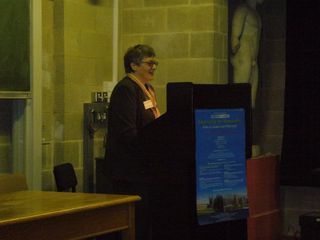Many Happy Returns
Tomorrow I am off to a very special eightieth birthday lunch. It's in college, and it's to celebrate the three score years and twenty of one of my old undergraduate teachers, Pat Easterling -- a wonderful critic of Greek tragedy, academic friend to at least half the classicists in the world, and the first and only female professor of Greek in the University of Cambridge.
Some 150 of her ex-pupils (almost all from Newnham) are showing up to wish her happy birthday, ranging from those who have remained in the Classics trade to those who have branched into business, law, medicine, theatre ... and almost anything else you can think of. (We'll be living proof that doing a Classics degree opens doors rather than closes them.)
But perhaps the most amazing thing is that the "encomium" to the birthday girl will be given by her (and my) old teacher, Joyce Reynolds, who is herself just coming up to 95 years old, and still doing front line academic work on Roman inscriptions. I imagine there must be something comforting about reaching 80 and still having the applause led by your old teacher.
For me the pleasure will be basking in the joy of still being the little one at age 59, watching my two old teachers still going strong, still ticking me off when I've forgotten something, and still just being there in the way they have been since I was 18. A few months ago Joyce read the whole of the typescript of my book on Laughter, just as she had read my Phd thesis decades ago. (Crikey I thought, when I first sat in her slightly scary study in 1973, would I ever have believed that, 40 years on, I'd still be going round for what amounted to a supervision?)
What's funny is that I know that we must now look a pretty elderly trio to all the new students that come up. But in my eyes Pat and Joyce look just like they have always done -- and, as Joyce herself once said, for her students in a way seem eighteen forever. (Come to think of it, whatever I know he looks like, I still see Mick Jagger as thirty . . .)
But part of the fun will also be meeting all my old student mates among the 150 who are coming -- and the reminiscences that I can already confidently predict we will share (largely because they are always the same). There will be the stories about how we always tried to get taught by Pat at 12.00 or 6.00, because there was a very strong chance that we'd be plied with a glass of sherry (those were the days).
And there will be the terrors of honesty and dishonesty with Joyce. These terrors always tended to cluster around the begining and end of term interviews, when we would be asked to come clean about what we had read (read in Latin or Greek, I mean) over the preceding term or vacation -- books she would then enter on a running list that she kept for each one of us. I soon got the idea that one could look as if one had read more, if one read short things -- and I built up a considerable expertise in the shortest book by every major classical author (shortest play of Euripides, shortest dialogue of Plato etc). But then I discovered Plutarchs Essays (the Moralia). They were a god-send because some of them were only a few pages long.
So after one vacation I brightly volunteered my short plays, my short dialogues, and Plutarch On Right and Wrong. Joyce I recall looked surprised. Why did you choose that, she asked. The temptation to come clean and say "Because it's only 4 pages, FFS" was almost irresistable. But instead I mumbled some complete whoppper about how I had become rather interested in the philosophical culture of Greeks in the Roman empire. She just nodded -- I slunk out of the room, convinced I had been rumbled.
Not as bad as one of my friends, who confidently claimed that (among other things) she had read Virgil's Twelfth Eclogue over the summer. It was only after she got out of the room that it struck her that Virgil had only actually written ten Eclogues. We still wonder whether Joyce had actually spotted the lie, but decided to say nothing, while marking my friend (now a very respectable Head Mistress) down as a callow liar. Or whether she just hadn't noticed.
Back then we were convinced that she would have spotted and would be storing the offence up to refer to darkly in some future job reference. Now, older and more realistic, I tend to suspect that Joyce might not have been quite so interested in this ritual as we fearfully imagined, and that it probably passed her by.
Mary Beard's Blog
- Mary Beard's profile
- 4071 followers




